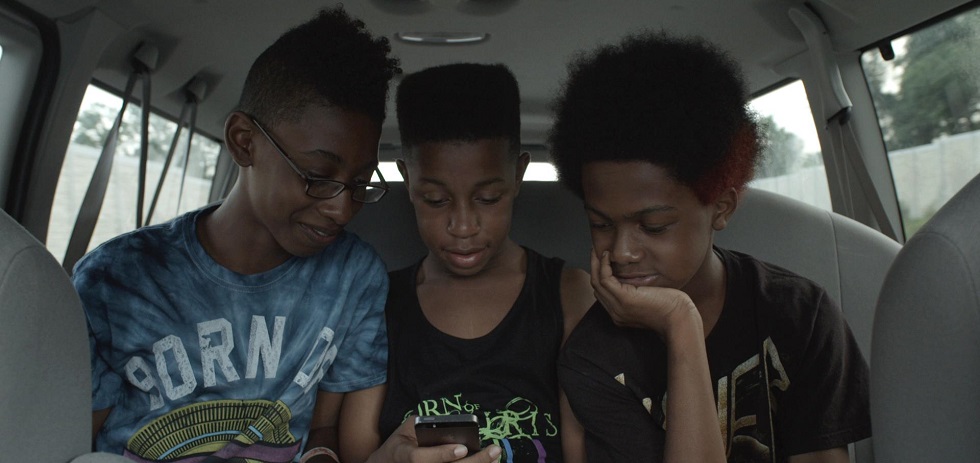Occasionally a film comes from left of centre, planting itself firmly as a front-runner in your mind as favourite of a festival. At this year’s Sydney Film Festival, for me that film has been Breaking a Monster, a wonderful takedown of the modern music industry machine disguised as a conventional documentary that simply tracks a band’s rise to stardom. The film focuses on Unlocking the Truth, a band comprised of 3 African-American 13 year olds (Malcolm Brickhouse, Alec Atkins, and Jarad Dawkins) who made waves when videos portraying them playing ridiculously heavy music on New York streetsides circulated across the internet. This led Luke Meyer, who had previously worked on Bennett Miller’s earlier non-fiction work, to direct a short film about them which he has extended into a feature length outing here.
The film kicks off like a conventional band bio-pic; we get to meet the boys and their families, we meet their agent (Alan Sacks, who most famously broke the Jonas Brothers), and we get to see them doing what they do best – shredding on their instruments. The boys seem to be semi-interested in super-stardom, but it’s not their only focus – they really just want to do normal teenager things. We see them skating, pranking each other, and just generally being juvenile – they’re very likeable characters and are clearly very into metal, something that cannot be said about those who surround them (although one of their dads is seen rocking a fantastic Bad Brains tee). On top of this, as is relayed in later moments which see Brickhouse responding to some thoughtful and pointed YouTube criticism, they are incredibly intelligent and switched on, and possibly more aware of their situation than would initially appear. It’s after these opening moments, with a recording contract thrust into the mix, that we begin to see an ulterior motive emerge in the piece – Meyer’s film is a critique of an industry built on exploitation at every level, and a portrait of an established institution in flux, with a business model that has been completely uprooted by new media technologies.
Breaking a Monster is jam-packed with rich emergent themes; moments tackle structural and institutional racism in the corporate music scene head on, portraying a white dominated industry who cannot form meaningful discussion with these three black teens that they have pigeon-holed based on their race (watching record executives float the idea of a record produced by Pharrell and Timbaland to the group of uninterested boys is darkly, perversely amusing) – it really does emphasize the whiteness at all levels of this major form of media. We see overt glimpses of cynicism from industry professionals (a great moment sees a Freudian slip from Alan Sacks at his most cartoonishly evil when he refers to consumers as “the kids”, before rapidly correcting himself, calling them “the fans” and saying that “it’s not about the money”). We are presented with a process whereby fun is corporatized – it seems the only person interested in actually ensuring Unlocking the Truth are having a good time is a person who works in wardrobe for the record label, who becomes one of the only people to actually clash with Sacks head-on, apart from the boys themselves. It’s also great to see a film like this that (disregarding a few later moments) avoids playing any sort of “ghetto” card, especially considering that Meyer (as the Documentarian) is the only person (apart from the aforementioned stylist) who doesn’t seem to be doing this in the film.
Throughout the film we see the boys rock a number of different T-Shirts from bands like Slipknot,1 Chelsea Grin, Born of Osiris and Veil of Maya.2 While I can’t say I’m a fan of many of the bands the boys listen to I am aware of their output and can say that it differs dramatically from what’s on display in Unlocking the Truth’s currently unreleased debut track, “Monster”, the song that engulfs the film’s latter half and was supposed to “break” the band. Instead, the output of these bands is far more closely related to the original composition in the viral video that made Unlocking the Truth famous; one track is far more akin to a breakdown in an Acacia Strain song than the (later) Metallica-esque stylings on display in “Monster”. Adding to that, the viral videos that broke the boys never had any lyrics, but it’s just not financially feasable in the minds of Sacks or the label to consider marketing a product that doesn’t have lyrical backing so Brickhouse is forced to sing, something that he does not enjoy and sounds too young to be doing, undermining the heaviness of the tracks themselves. A telling scene later in the film sees Brickhouse tell the cameraman that they have been told to pursue a more mainstream sound for “popularity reasons”. For me, this is the final nail in the coffin; the boys no longer playi because it’s fun, they are play because it is potentially profitable.
By the same token, we do see glimpses of the boys living the dream and enjoying it. A particularly great sequence sees them playing at Coachella on the main stage, before crowdsurfing to the back of the pit after the set – it is clear that these moments alone make all the trials and tribulations worth it in the minds of the boys. Whether or not this is fun is a fair trade for the long term financial issues that their record deal poses, especially considering that they were told they might get one or two records out of it but were instead locked into a file album deal,3 and that their technical ability is not on par with what is necessary for a successful independent Metal band yet (then again, they couldn’t be classified as an independent band by any stretch of the imagination, even their Wikipedia page is clearly written by a PR company),4 is up for debate.
On a technical level, Breaking a Monster is beyond proficient. Meyer is an ever-present guiding presence that still tends far more towards a vérité style of filmmaking than spoon-feeding his audience diatribes. The cinematography is rich, and there is a clear juxtaposition of the traditional, more realistic mode through which the day-to-day segments are shot and the more dreamlike concert sequences. Meyer is a master of his craft finding an emergent storyline to colour his footage such that it doesn’t come across as a puff-piece or conventional promotional material.
Despite some later moments that tend to drag, and the incessant earworminess of the eventual final incarnation of the track “Monster” that has coloured my post-film experience,5 Breaking a Monster is a really interesting journey into a world that just feels quite outdated at this point in time. I really do hope everything works out for Unlocking the Truth; they’re extremely talented, switched on boys and deserve any fame that they get (although I’m not sure that their manager or label necessarily realize this). This documentary is extremely proficient and well worth a look, a great companion piece to Meyer’s other two features, Darkon and New World Order,6 that both also purport to be doing one thing with their narrative but, in actual fact, do something altogether different.


